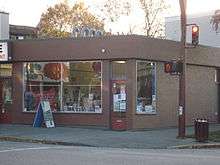Camas Bookstore and Infoshop

The Camas Infoshop is a not-for-profit and collectively run infoshop, bookstore and autonomous space located on Lekwungen Territory in Victoria, British Columbia, Canada. Camas first opened its doors in September 2007, with the intention of providing a voice for anti-authoritarian and anti-colonial perspectives and local struggles, and helping to foster a spirit of solidarity with other such struggles taking place globally.
Camas provides literature on topics including: anti-imperialism, indigenous peoples, black power, queer/trans, feminism, radical and local ecology, health and food security, DIY/self-sufficiency, and anarchism. Many of the books that Camas sells are donated from the community, and as a not-for-profit and volunteer-run project, all of the revenues generated from book sales are put towards keeping the space alive and thereby offering an active place for people to meet, organize projects, hold events or discussion groups, and to build non-hierarchical networks and communities of mutual aid, autonomous from state or corporate dependency.
In October 2012 Camas Books moved to a new location at 2620 Quadra, less than half a block away from the original location.
Name and symbolism
The collective is named in honour of the camas plant (camassia quamash), which was once cultivated and harvested as a root vegetable by the local Lekwungen prior to European settlement. With the arrival of European settlers and colonialism, the harvest quickly came to an end as the camas meadows in the region were largely destroyed by the settlers’ cattle grazing practices, as well as the encroachment of the settlers’ agricultural lands and eventually urbanization. More recently, efforts have been made to revive the harvest. The camas flower thus signifies the importance of acknowledging the history of colonization in the territory on which the bookstore is situated, as well as the ongoing struggles against colonialism today. The collective envisions the camas flower one day being able to blossom forth from beneath the pavement that now restrains it, flourishing on this land once again. The symbol of the camas also captures the importance of ecological struggle as well as local sustenance and food security as central aspects of the broader struggles against capitalism and colonialism.
External links
Coordinates: 48°26′14.91″N 123°21′31.7″W / 48.4374750°N 123.358806°W